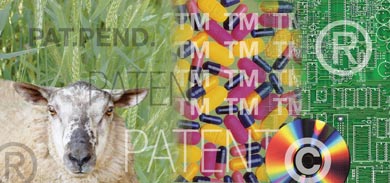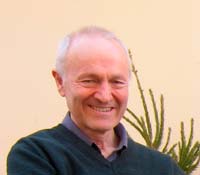
The new enclosures - intellectual property rules, OK?
 When common land was taken into private hands in England from the 16th century it began a period known as the enclosures. Today, a new set of enclosures is rapidly occurring of different kinds of commons. These new enclosures result from the way, and in whose interests, the rules of the world affecting food, farming and biodiversity have changed dramatically since the early 1990s.
When common land was taken into private hands in England from the 16th century it began a period known as the enclosures. Today, a new set of enclosures is rapidly occurring of different kinds of commons. These new enclosures result from the way, and in whose interests, the rules of the world affecting food, farming and biodiversity have changed dramatically since the early 1990s.
A major change is that now new rules are introduced globally through various international negotiations and institutions, not simply enacted in any one country. Some concern biodiversity, others plants and animals, still others what may seem esoteric areas like patents, trademarks, copyright and plant variety rights - called ‘intellectual property rights’. The key change has been in the extension of rules on 'intellectual property' globally into food and farming.
This change happened when key vested interests got rules on 'intellectual property' extended globally by including them in the set of negotiations that led to the creation of the World Trade Organisation (WTO) in 1995. Subsequently, I was closely involved with negotiators in Geneva dealing with these rules at the WTO and the World Intellectual Property Organisation (WIPO) through two major pieces of work. One was with the Quakers, through the Quaker UN Office (QUNO), Geneva and the Quaker International Affairs Programme (QIAP), Ottawa, and the other through the UK Deparment for International Development (DFID) funded UNCTAD/ICTSD project on IPRs and Development.
 I spent a lot of time at Quaker House in Geneva (on the right) in the early 2000s as senior consultant for the intellectual property and development programmes of both QUNO and QIAP.
I spent a lot of time at Quaker House in Geneva (on the right) in the early 2000s as senior consultant for the intellectual property and development programmes of both QUNO and QIAP.
This work aimed to enhance the fairness of the negotiating processes, particularly around the Agreement on Trade-Related Aspects of Intellectual Property Rights (TRIPS) in the WTO. The work began from a concern over the impact on food security and biodiversity of rules in the WTO on patents and plant variety protection. In response to the needs of developing country negotiators and concerns from Quakers in Africa, it extended to cover the impact on access to medicines and the role of other bilateral and multilateral negotiations. Providing information to decision-makers and facilitating off-the-record dialogue were the main methods used.
The programme published background, discussion, issues and occasional papers dealing with different aspects of intellectual property, food, health and biodiversity. All are freely available on the web and can be downloaded from this page.
I have written many other papers about these issues and you can find them here
Resources and People
The materials produced with the Quakers are available here. Some of those from work with others are here

Peter Drahos is a world renowned authority on 'intellectual property' who has researched extensively on the way the patent system, and other systems of privileges that comprise 'intellectual property', have been developed and are being used today.
Peter is a Professor in Law and the Director of the Centre for the Governance of Knowledge and Development in the Regulatory Institutions Network (RegNet), College of Asia and the Pacific, at the Australian National University, Canberra. He also holds a Chair in Intellectual Property at Queen Mary, University of London
Peter's publications include:
- Information Feudalism: Who Controls the Knowledge Economy? (with John Braithwaite), Earthscan, 2002
-
The Global Governance of Knowledge: Patent Offices and their Clients, CUP, 2010
- Global Intellectual Property Rights: Knowledge, Access and Development, (with Ruth Mayne), Macmillan, 2002
- Global Business Regulation, (with John Braithwaite), Cambridge University Press, 2000
- A Philosophy of Intellectual Property, Dartmouth, 1996